With so many new freedoms being granted to women in Saudi Arabia these days, I have been wondering if the restrictions on women concerning her role in mosques would ever change.
For 1,400 years since the beginnings of Islam, women have not been allowed to call the Adhan, or the ‘Iqaamat As-Salat’, lead congregational prayers (As-Salat) nor give sermons (Khutbahs), etc.
I wondered if that would ever change in the future. So, I decided to do a bit of research on the issue and here is what I found out.
So, is a Muslim woman really allowed to call the Adhan at the mosque? Most Muslim jurists agree that women are NOT allowed to call the Adhan nor lead prayers at the mosque. Calling the Adhan involves raising the voice and women are not permitted to do so. However, she can call the Adhan at home only if the congregation is all women. Also, she can lead them in prayer by standing in the middle of the first row.
Now on the surface of things, this restriction seems quite sexist. Muslim men get to do everything and the women get left out.
Whilst it might seem hard, it is the Muslim men who seem to regret it more. The sound of the Adhan and recitation of the Quran is usually sweeter and much more attractive when done by women.
The fact that a woman’s voice is altogether more beautiful and enticing is one of the reasons why, in Islam, such a prohibition on women calling the Adhan exists.
The Voice of The Woman Is Fitnah!
To be executed correctly, both the Adhan and the Iqaamat As-Salat require that the voice be extended and beautified. To a man, women’s voices are already naturally sweet and alluring even without the additional vocal beautification required.
Though it would sound great on the ears, a woman’s voice calling the Adhan could result in raising a man’s passions and possibly lead to some form of desire or sexual distractions, Fitnah.
Causing emotional provocation in men before standing for prayers really defeats the object of prayer which is the sincere worship of Allah (SWT).
To avoid this, Allah (SWT) in the Holy Quran advises the wives of Prophet Mohammed (SAW) NOT to use a soft and gentle voice when speaking to men in case it (the softness of voice) exposes their vulnerabilities, but to use appropriate speech.
The same instruction in the verse about using the correct voice when speaking to men who are non-relatives applies generally to all Muslim women. https://quran.com/33/32
يٰنِسَآءَ النَّبِىِّ لَسۡتُنَّ كَاَحَدٍ مِّنَ النِّسَآءِ اِنِ اتَّقَيۡتُنَّ فَلَا تَخۡضَعۡنَ بِالۡقَوۡلِ فَيَـطۡمَعَ الَّذِىۡ فِىۡ قَلۡبِهٖ مَرَضٌ وَّقُلۡنَ قَوۡلًا مَّعۡرُوۡفًا ۚ
Translation by Sahih International
O wives of the Prophet, you are not like anyone among women. If you fear Allah, then do not be soft in speech [to men], lest he in whose heart is disease should covet, but speak with appropriate speech. Quran 33:32
Click here to read and listen to the verse in the Holy Quran.
Prophet Mohammed (SAW) and His Wives Are Models Of Behaviour
In the above Surat Al Azab Verse 32, although Allah (SWT) only addresses the wives of Prophet Mohammed (SAW), his house and his family are intended as a model for all Muslim women to follow.
As is the case with the wives of the Prophet Mohammed (SAW), Muslim Women are no ordinary women.
Now, the verse does not restrict women talking and communicating with unrelated men altogether. For practical reasons, Muslim women can, of course, communicate in normal ways with men who are non-relatives so as to achieve everyday needs such as shopping in the market, in the shops, in schools and colleges, on the phone and when she is out and out and about.
However, her manner of speech and the tone of voice should be curt and uninviting. Her voice should not be the reason to cause him to raise his interest or hopes.
Her speech should be direct, unemotional, without affectation and minus the feminine softness that might stimulate his interest and cause him to make unwanted advances. That is the understanding of that verse.
For example in Saudi Arabia, women speak almost coldly and in a rough neutral manner-definitely unattractive and off-putting to men in general. How respectful to Allah (SWT) and his injunctions.
Women Are Not Required To Make The Adhan
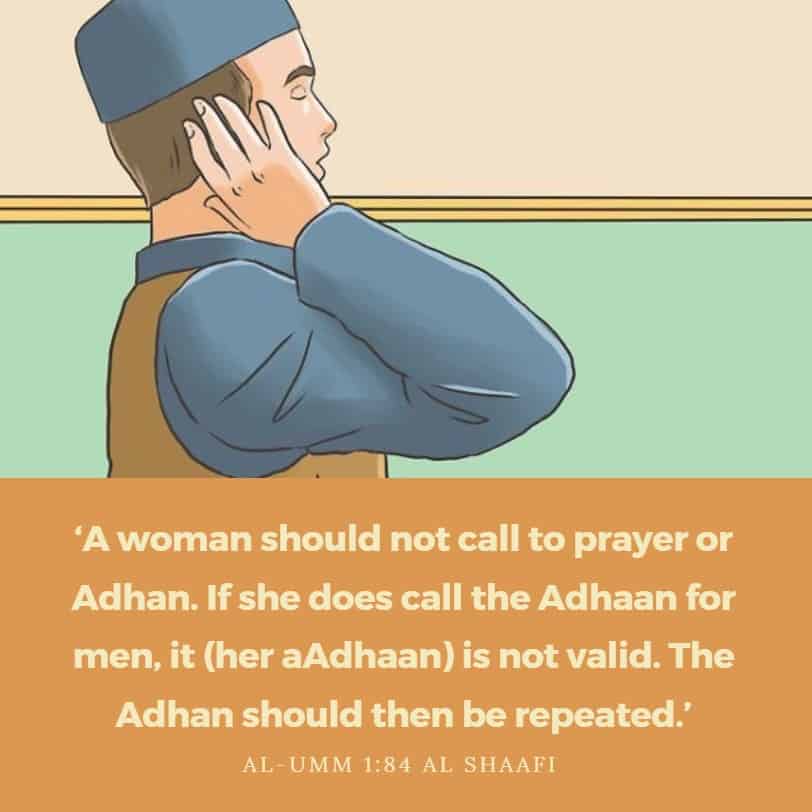
The Adhan is only to be made by a Muslim man of sound mind and who is able to pronounce and vocalize the words clearly and beautifully in Arabic.
In Islam, women are not required to call the Adhan. It is a job that was/is assigned to men to do. That is because the Adhan is a way of inviting others and telling other people that the prayer is about to start. They are not allowed to perform this role.
Also, calling the Adhan involves raising and beautifying the voice to be heard by an unquantifiable number of men. This they are also not permitted to do.
Women Can Lead Other Women in Prayers, But Not Men
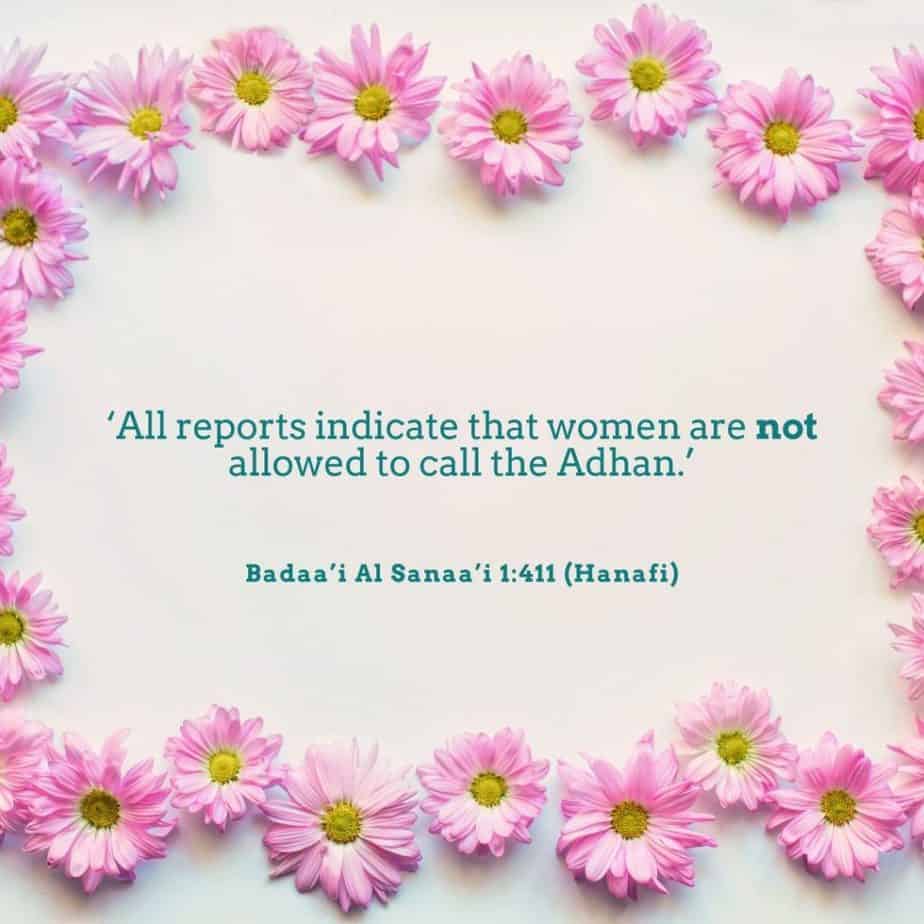
Although it is not mentioned in the Holy Quran, there is sufficient evidence in the sunnah of Prophet Mohammed (SAW) that women are permitted to lead other women ONLY in prayers.
To this end, they can call the Adhan, make the Iqaama and lead a group of women in much the same way as men in prayer (Salat), except that instead of standing out in front alone as is the practice of the male Imam, they stand in the middle of the first row or line of women during the prayer.
For example, a collection of hadiths (below) report that Aisha (RA) the wife of Prophet Mohammed (SAW) led other women in prayer. She first used to make the Adhan, then the Iqaamah and would stand in the middle of the same row and lead the women in prayers (Fard) including during the month of Ramadhan.
Ra’tah Al Hanafiyyah by Abu Hazim Ibn Habib
- Abdur-Raziq 5086
- Ad-Daraqutni 1:404
- Al-Bayhaqi 3:131
Other hadith (below) mention than Um Salamah also used to lead women in Asr prayers and stand among them in the same row.
`Ammar Ad-Dahni reported this from a tribeswoman called Hujayrah
- Ash-Shafi`i 315
- Ibn Abi Shaybah 88:2
- Abdur-Raziq 5082
Today, three of the four Sunni Madhabs allow women to lead other women in prayers; Shafi’s, Hanafis and Hanablis. However, the Maliki school does not permit women even to lead other women in prayer.
So generally, it is permissible for women to call the Adhan, do the Iqamaa and lead other women in prayer, but not for them to lead men. This is the view of ALL the four Sunni Madhabs including the seven jurists in Madinah of the Tabaaeen, the successors and those that came after.
Prophet Mohammed (SAW) Never Permitted In His Lifetime
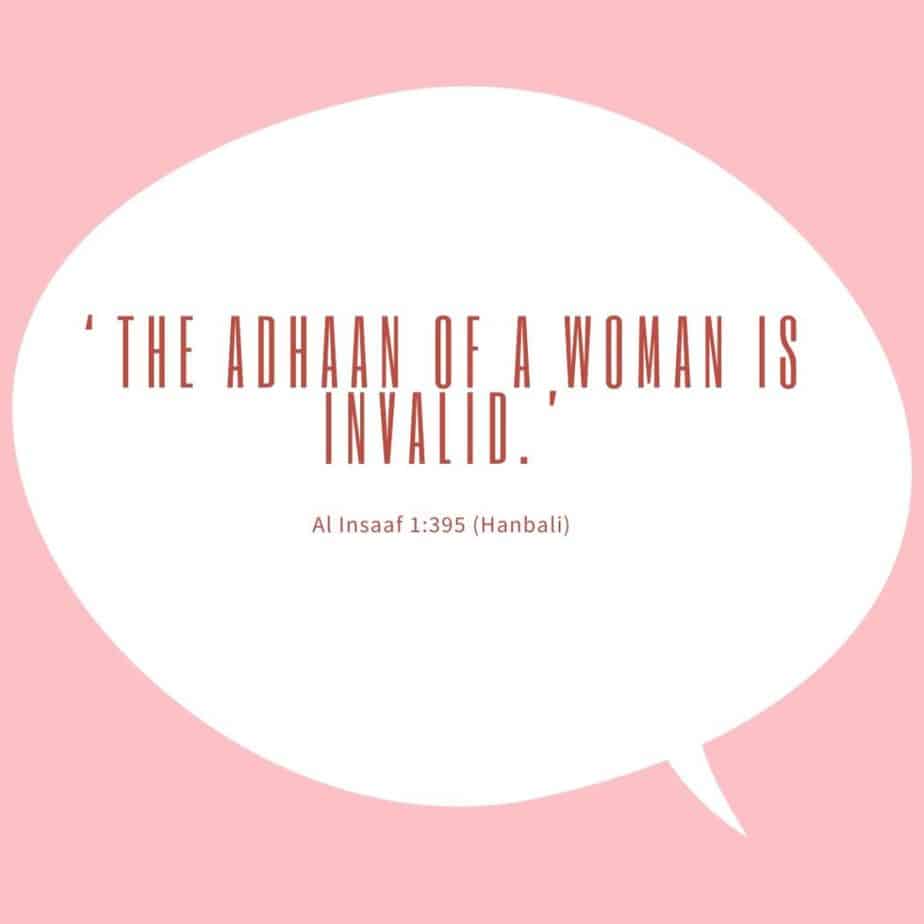
Throughout his short life as Prophet Mohammed (SAW) never once asked women to call the Adhan or to lead prayers in a mosque. Given that his home in Madina was part of the mosque, he could have asked his wife Aisha (RA) or his daughter Fatima (RA) to make the Adhan in the mosque even once, but he never did. The same is true of the companions (Sahabah) and the early Muslims. They never did, either.
In The Hoy Quran, Allah (SWT) Allah warns those who oppose the guidance of Prophet Mohammed (SAW) once it had been decided would suffer severe consequences.
وَمَن يُشَاقِقِ ٱلرَّسُولَ مِنۢ بَعْدِ مَا تَبَيَّنَ لَهُ ٱلْهُدَىٰ وَيَتَّبِعْ غَيْرَ سَبِيلِ ٱلْمُؤْمِنِينَ نُوَلِّهِۦ مَا تَوَلَّىٰ وَنُصْلِهِۦ جَهَنَّمَ وَسَآءَتْ مَصِيرًا
And whoever opposes the Messenger after guidance has become clear to him and follows other than the way of the believers – We will give him what he has taken and drive him into Hell, and evil it is as a destination.
The Holy Quran 4:115 Sahih International
Click here to listen to and read the verse in the Holy Quran about opposing Prophet Mohammed (SAW).
about opposing Prophet Mohammed (SAW).
Form the above verse we can safely say that the restriction on women calling the Adhan and leading prayers is self-evident, yet modern feminists and reformers waste time and their precious merits discussing and debating the matter.
Prophet Mohammed (SAW) Urged Women To Offer Prayers At Home
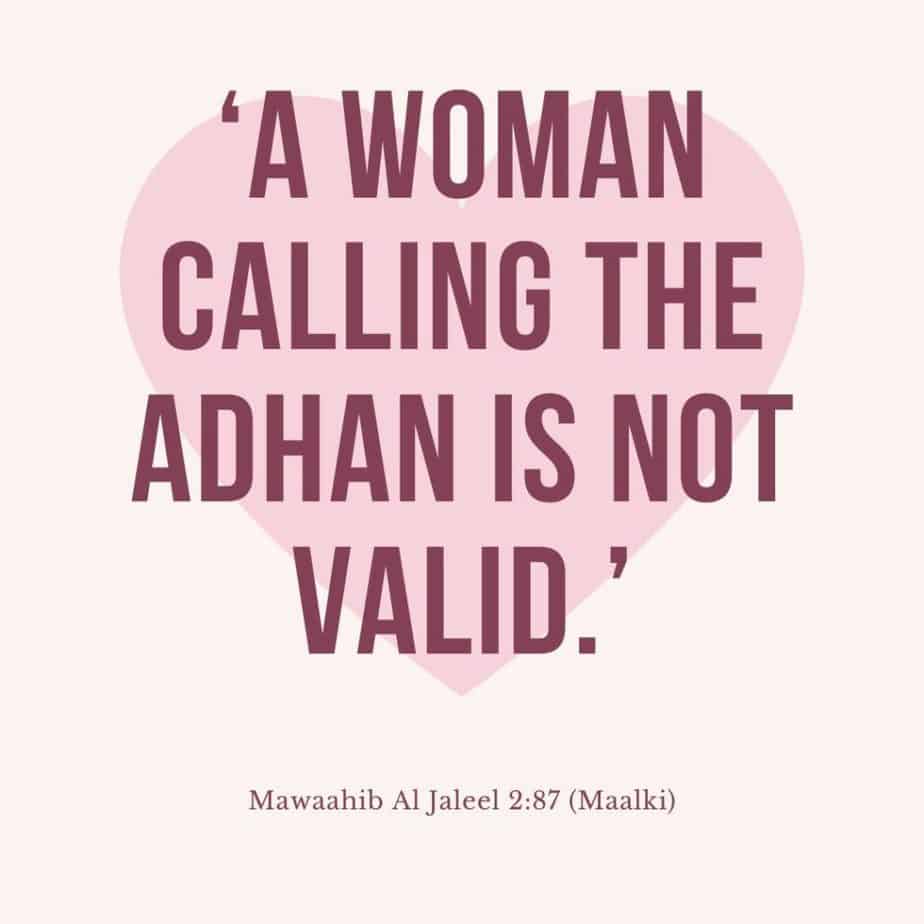
Rather than participate in activities in the mosque, Prophet Mohammed (SAW) preferred that women offered their prayers at home.
At the time of the Battle of Badr in 624 CE, a woman called Um Waraqa approached Prophet Mohammed (SAW) seeking permission to join the battle to offer her support.
It was the custom back then in Arabia to allow women to attend the men at the battlefield for treating the sick and wounded, or providing food and drink, etc.
Um Waraqa so dearly wanted to be a martyr (Shaheed). Prophet Mohammed’s (SAW) reply was to send her home and he ordered her not even to go out of the home to pray.
Um Waraqa had memorized the Holy Quran in its entirety. At the same time, Prophet Mohammed (SAW) ordered her to lead her household (Nissa Dariha or Ahl Dariha) as Imam in the formal prayers ( Fard Salat).
There were many people in her home, so Prophet Mohammed (SAW) appointed an old man to make the call to prayer or Adhan. Nearly all of the Muslim men were absent because they had been enlisted in the army to fight at the Battle of Badr.
However, because Um Waraqa was so accomplished she was a natural choice. There is some debate about whether her household included men.
Most scholars though recognize that the choice of Um Waraqa as a prayer leader in her home at that time was more an exception rather than the rule.
Prophet Mohammed (SAW) then promised her that Allah (SWT) would make her a martyr simply by her staying at home. She later became a martyr at the hands of two slaves who later escaped and then ran away.
So it is not obligatory for women to pray in the mosque. Equally, it is better for them to pray the five obligatory prayers at home.
The Prophet (peace and blessings be upon him) said:
“Do not prevent women from going to the mosques, although their houses are better for them.”
Abu Dawood 567 Classified as Saheeh Al Baani in Irwa’ al-Ghaleel, 515.
Women Stand Behind Men In Rows
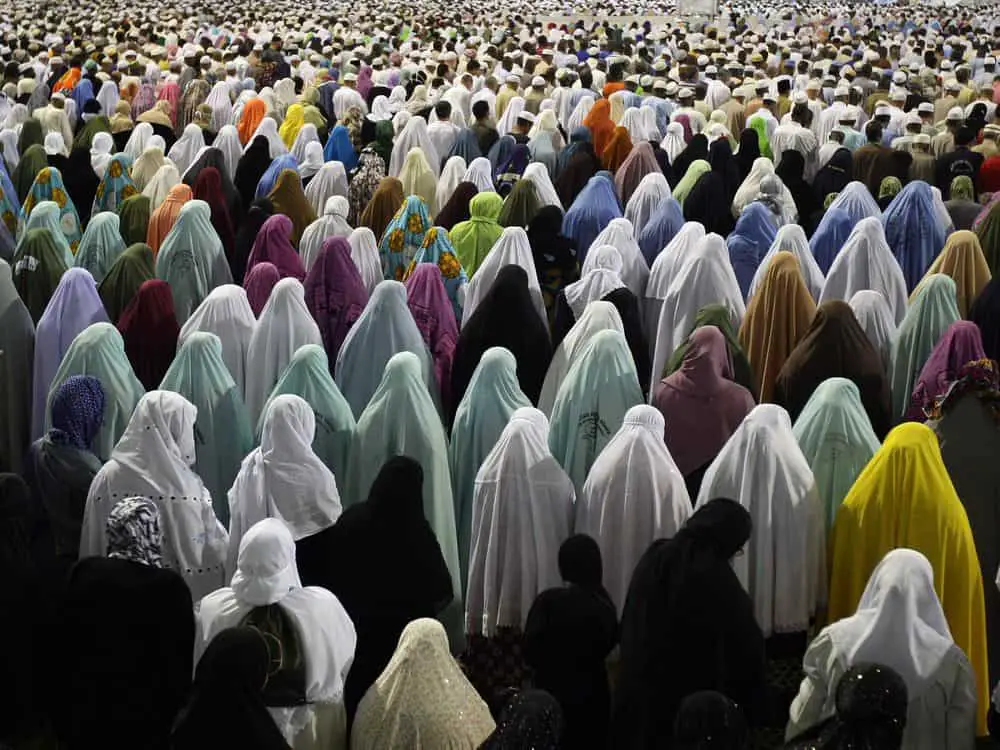
During the formal prayers (Salat), men stand close together, feet to feet and are expected to pray with focus and sincerity. Women also stand in line in the same way but they position themselves in rows behind the men.
With women out of the line of sight of men, it allows women to maintain their modesty (Haya).
Speaking of prayer positions in the mosque, Prophet Mohammed, said,
“The best of the men’s rows is the first, and the worst is the last, and the best of the women’s rows is the last and the worst is the first”.
Muslim
The hadith above shows us the worst and best positions for men and women to stand during formal prayers. If this is true, then how can a woman calling the Adhan, making an address (Khutbah) or even praying ahead of men be something desirable yet alone permissible in Islam?
Related Questions
Is the voice of women considered to be Awrah? No! But they should not speak in a soft, alluring manner to men.
Are there any mosques only for women? Yes, there are 16 in China and 5 in other Asian countries. Also, Africa and Europe have 2 and in the USA there are 3. (See IMI). The goal is to maintain a safe and free space for women, cultivate learning and the observance of daily religious practices.
Are there any Muslim feminists? Yes! They seek greater equality and rights for women in the framework of Islam. They question the traditional patriarchal Islamic interpretations in the Quran, Hadith and Sharia Law to bring about change for women. Though Islamic in the orientation they employ the usual secular and Westernized feminist discourse to stay connected to the worldwide feminist movements
Useful References and Resources
- Feminist Theology
 -Wikipedia
-Wikipedia - Women as Imams
 – Wikipedia
– Wikipedia - Women’s Mosques– Wikipedia
- Women not allowed to call Adhan for Men
 – Islam web
– Islam web - Ibn Kathir Tafseer
 -Tafsir Ibn Katheer Recite Quran
-Tafsir Ibn Katheer Recite Quran - Can Women lead other Women in Salat
 -Facebook Post
-Facebook Post - Are Women permitted to recite the Adhan in Islam?
 Quora
Quora - Is a woman’s voice Awrah? Islam Question and Answer
- Women Imam lead men and women in Sala
 t- Islamcity
t- Islamcity - Um Waraqa
 -Wikipedia
-Wikipedia - Surat Al Ahzab
 – Islamcity
– Islamcity - Muqbil bin Hadi al-Wadi’i-Wikipedia
- Requirements for Calling The Adhan
 -Islamweb
-Islamweb - Can Women do the Adhan?
 Turn To Islam
Turn To Islam - Prayer in congregation or prayer at home for women?
 Islam Q & A
Islam Q & A - The Intimate Parts in Islam
 -Wikipedia
-Wikipedia - A woman’s’ voice is not Awrah but she has to speak modestly– Islamweb
- AL-TA1-11UR FI SJIARlI ALFAZ AL-TA1VB1H
 Nawawi
Nawawi
